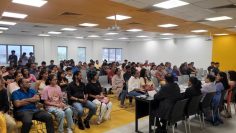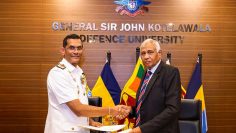
IELTS: gateway for Sri Lankans traveling to the US for higher education
IELTS, the English test for study, migration or work is recognised in over 140 countries worldwide including the USA. Amy E. Carter, Senior Marketing Manager from IELTS USA was in Sri Lanka recently speaking at the Fulbright Commission in Colombo, to students hoping to travel to the US for study.
IELTS USA was established in 1999, and has since been widely accepted and used by over 3000 US institutions as an accurate measure of English language skills at all levels. IELTS stands for International English Language Testing System, and measures the language proficiency of people who want to study or work in a country where English is used as the primary language of communication.
There are two tests available; Academic, for those applying for higher education and professional registration, and General Training for those migrating to Australia, Canada and the UK, or applying for secondary education, training programmes and work experience in an English-speaking environment. Both test four language skills of listening, reading, writing and speaking.
In the US, IELTS has increased in popularity with education institutions that need to use English proficiency tests to measure language capability when they recruit students. These may be two or four year higher education institutions, boarding and independent secondary schools, law programmes or professional accrediting bodies. The same IELTS test is conducted around the world for any other English speaking country at a point in time.
Ms Carter noted that students in particular would need to carefully research institutions they are applying to in the States to find out whether the school requires an IELTS score from students whose first language is not English. “If English is not their primary language, most schools require international applicants to take an IELTS test to demonstrate their capabilities. In the US, IELTS is generally required at associate and undergraduate levels, and for post-graduate programmes, including law and business, depending on the institution’s requirements.” She also recommended that they be retaken after two years, as the scores remain on the system for a two year period only. “We find that the language needs to be used regularly for the speaker to remain at the same proficiency level. So the score should only be accepted and used within two years, and must be retaken if the student is applying to a university after this period.”
For students who find US education expensive, Ms Carter recommends the 2+2 programme, whereby students attend two years at a community college and complete their final two years at a college or university that has an articulation agreement with the community college.
IELTS’ partner in Sri Lanka, The British Council, offers an IELTS scholarship that runs annually. One student intending to study in the USA is selected each year. In addition, students may explore other scholarship schemes offered by individual universities. To qualify, the student must provide proof of acceptance to a university in an English speaking country, take the IELTS within a certain time frame and complete other application requirements. In 2016, a student used this award to attend the prestigious Duke University in the US.
Visit takeielts.britishcouncil.org for more information on taking the IELTS test in Sri Lanka.






